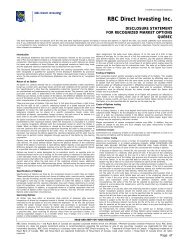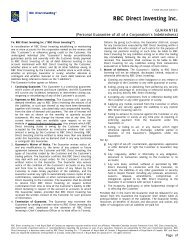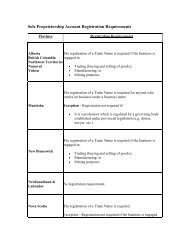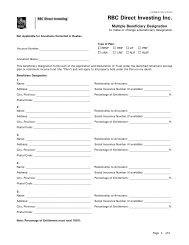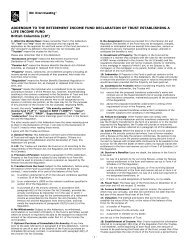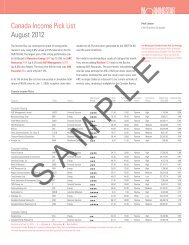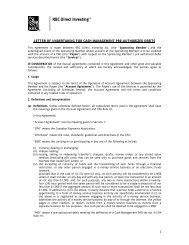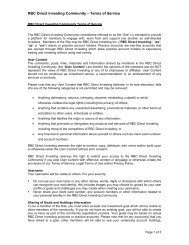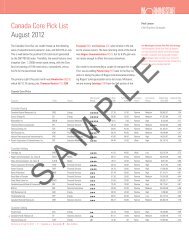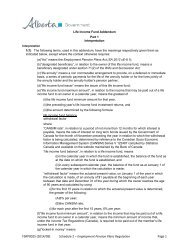View Sample PDF - RBC Direct Investing
View Sample PDF - RBC Direct Investing
View Sample PDF - RBC Direct Investing
Create successful ePaper yourself
Turn your PDF publications into a flip-book with our unique Google optimized e-Paper software.
Global Fixed income markets • Soo Boo Cheah, CFA • Suzanne Gaynor<br />
U.S. private-sector balance sheets<br />
are on a much firmer footing than is<br />
generally believed and suggests further<br />
aggressive deleveraging is no longer<br />
warranted. This argues for a more<br />
conservative stance toward bonds.<br />
Bond yields at their current low levels<br />
are pricing in a raft of bad news. We<br />
acknowledge that the threat from the<br />
European crisis could wreak havoc<br />
on financial markets, leading to even<br />
higher fund flows into safe-haven<br />
government bonds. Concern about the<br />
Eurozone is less about the departure of<br />
Greece and more about the secondary<br />
effects on other peripheral economies<br />
and bond markets. The most likely<br />
immediate impact would be a surge<br />
in sovereign-risk premiums for other<br />
member states. This would be met<br />
with temporary capital controls across<br />
the EMU to curb bank runs, choking<br />
off credit and likely destroying wealth<br />
around the globe. In the U.S., politics<br />
are highly polarized, suggesting that<br />
much needed private investment to<br />
boost the economy is off the table until<br />
at least after the November election.<br />
The looming “fiscal cliff” – a mix<br />
of higher personal taxes and lower<br />
spending – could pare as much as 4%<br />
from U.S. economic growth and further<br />
depress U.S. Treasury yields. We do<br />
not place much weight on this worstcase<br />
scenario. The other risk pertains<br />
to an economic-growth slowdown in<br />
emerging markets, where relatively<br />
fast growth has been offsetting nearrecessionary<br />
conditions in much of the<br />
developed world. The plethora of nearterm<br />
risks could send bond yields to<br />
new lows.<br />
While the aforementioned risks could<br />
push yields to new lows over the short<br />
Exhibit 4.<br />
Multiple<br />
Exhibit 5.<br />
Multiple<br />
5.0<br />
4.5<br />
4.0<br />
3.5<br />
3.0<br />
2.5<br />
2.0<br />
1960 1964 1968 1972 1976 1980 1984 1988 1992 1996 2000 2004 2008 2012<br />
7.0<br />
6.5<br />
6.0<br />
5.5<br />
5.0<br />
4.5<br />
4.0<br />
3.5<br />
U.S. Net Worth to Nominal GDP<br />
Average = 3.6x<br />
Source: SED, Bloomberg, <strong>RBC</strong> GAM<br />
U.S. Net Worth to Personal Disposable Income<br />
Average = 4.9x<br />
3.0<br />
1960 1964 1968 1972 1976 1980 1984 1988 1992 1996 2000 2004 2008 2012<br />
Source: Bloomberg, <strong>RBC</strong> GAM<br />
SAMPLE<br />
term, we believe a reflation trade<br />
could emerge in the longer run. We<br />
expect more pro-growth governmental<br />
policies to appear in the pipeline. This<br />
scenario would contravene the extreme<br />
pessimism embedded in bond prices<br />
and warrant a reallocation out of safehaven<br />
assets. Bond yields are most<br />
at risk under this scenario, especially<br />
given their extremely rich valuations<br />
and crowded positioning. Also, the<br />
rationale for holding bonds to preserve<br />
capital is getting less appealing as<br />
rates fall. A small jump in interest rates<br />
would more than erase any returns<br />
from income as capital erodes. This is<br />
the thinking behind our bias for higher<br />
rates, but we are conscious that this<br />
is a bet on policymakers coming up<br />
with solutions that can bridge today’s<br />
polarized politics.<br />
<strong>Direct</strong>ion of rates<br />
We remain mildly bearish on bonds<br />
over the next 12 months. Our yield<br />
forecasts for Canada and the U.S.<br />
are a touch higher than they were<br />
in the previous quarter, reflecting<br />
The global investment outlook <strong>RBC</strong> INVESTMENT Strategy coMMITTEE Summer 2012 I 37



